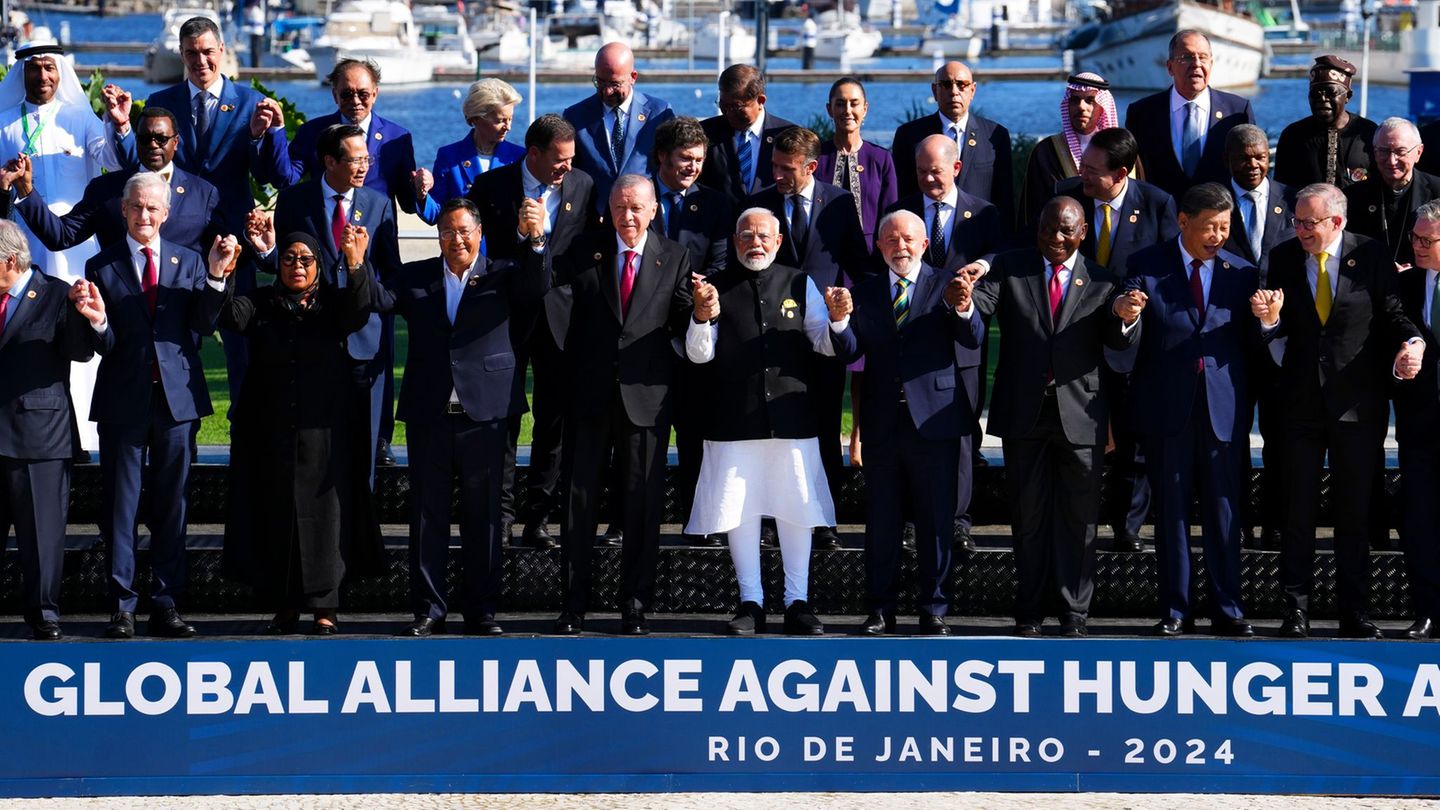Meeting of economic powers
G20 summit: minimal consensus on Ukraine and the Middle East
Copy the current link
There is no condemnation of Russia and no mention of the Hamas massacre in the final document. But host Brazil can accommodate its most important points: hunger, climate and UN reform.
With a minimal consensus on the wars in Ukraine and the Middle East, the G20 of leading economic powers barely managed to reach a joint summit declaration in Rio de Janeiro. The 85-point document was published by the Brazilian presidency on the first day of the summit.
As was the case at the summit in India last year, the Russian war of aggression against Ukraine is no longer explicitly condemned by a majority of countries. This was still the case at the meeting in Bali two years ago. Russia – itself a G20 member – is again not mentioned in the passage about the Ukraine war. There is only a general reference to “human suffering and the negative additional impacts of war”, for example on food and energy security.
Middle East: Hamas terrorist attack not mentioned
From a German perspective, not only is this passage difficult to accept, but also the one about the war in the Middle East. There is no mention of the Hamas terrorist attack on Israel on October 7, 2023. Before the summit, it was said in German government circles that such a result of the negotiations would be “unacceptable”.
In the statement, the “Group of 20” is now concerned about the humanitarian situation in the Gaza Strip and the escalation in Lebanon. Humanitarian aid must urgently be expanded and protection of the civilian population strengthened – a clear message to Israel. The G20 also reaffirmed the Palestinians’ right to self-determination and an “unwavering commitment” to a two-state solution.
Before the summit, Israel’s Foreign Minister Gideon Saar demanded that the G20 communiqué recognize Israel’s right to self-defense, demand the release of all hostages and condemn the terrorist organizations Hamas and Hezbollah, against which Israel is waging war in the Gaza Strip and Lebanon. A statement that fails to mention these points will only encourage Iran and its allies to continue sowing instability throughout the Middle East, Saar wrote.
The two conflicts in Ukraine and the Middle East are where the biggest rifts exist between the G20 states. It includes the large Western democracies such as the USA, Germany, USA and Great Britain, but also authoritarian states such as Russia and China. Host Brazil, as well as countries like India and South Africa, are between the two camps.
The host, Brazilian President Luiz Inácio Lula da Silva, did not even put the two wars on the agenda. And to the annoyance of Germany and other Western countries, he did not invite Ukrainian President Volodymyr Zelensky. Lula pursued an agenda that primarily emphasized the issues of the so-called “global south,” i.e. the emerging countries of Latin America, Africa and Asia.
Hunger, global warming, taxation of the super-rich
He was able to include important points in the final document: the fight against hunger and global warming as well as a reform of international organizations.
The G20 countries also want to work for effective taxation of the super-rich in the future. Without interfering with the states’ tax sovereignty, we will make joint efforts to effectively tax very wealthy individuals, the statement says. This confirms a minimal consensus of the G20 finance ministers from July.
The billionaire tax is based on a proposal from the host country Brazil. According to this, all people with assets of one billion US dollars or more should pay at least two percent annually to their home country. It is estimated that this would have affected around 3,000 people – it could have brought in additional tax revenue of up to $250 billion per year worldwide.
But even before the meeting of the G20 finance ministers in July, influential countries such as the USA and Germany – at the time with a finance ministry led by the FDP – positioned themselves against the Brazilian proposal. Here too, only a minimal consensus was reached, which is now supported by the heads of state and government.
NGO criticizes passage on climate protection
In addition, the G20 countries in Rio reaffirm the internationally agreed goal of limiting global warming to 1.5 degrees. With regard to the issue of climate financing, we are pleased with the successful outcome of the World Climate Conference in Baku.
According to the environmental organization Global Citizen, the G20 states are thus passing on their responsibility. “Although the G20 members are the main blockers, they have once again passed the buck and left it to others to clean up the chaos,” criticizes Vice President Friederike Röder.
EU Commission President Ursula von der Leyen, however, is satisfied with X. The joint declaration will advance the fight against global poverty and climate change.
UN Security Council should be modernized
In the final declaration, the G20 states also declare that they want to work towards reforming the UN Security Council. The most important industrialized and emerging countries are calling for better representation of the previously underrepresented regions of Africa, Asia, Latin America and the Caribbean.
The Global Alliance Against Hunger and Poverty was also launched in Rio. There is a lack of knowledge or resources, but of political will to give people access to food, says the final declaration. The group advocates for school feeding programs or improved access to microfinance. The initiative is one of the central themes of the Brazilian G20 presidency. “This will be our greatest legacy,” Lula said at the start of the summit.
Scholz meets Xi – discussion about arms deliveries
On the sidelines of the second day of the summit, Federal Chancellor Olaf Scholz (SPD) wants to discuss the Russian war of aggression against Ukraine again with Chinese President Xi Jinping. Among other things, the topic of arms deliveries to Russia will be discussed. Foreign Minister Annalena Baerbock had previously reported on findings about the export of Chinese drones to Russia and threatened consequences. Scholz also wants to address the use of North Korean troops in the Russian war of aggression against Ukraine.
dpa
Source: Stern
I have been working in the news industry for over 6 years, first as a reporter and now as an editor. I have covered politics extensively, and my work has appeared in major newspapers and online news outlets around the world. In addition to my writing, I also contribute regularly to 24 Hours World.




